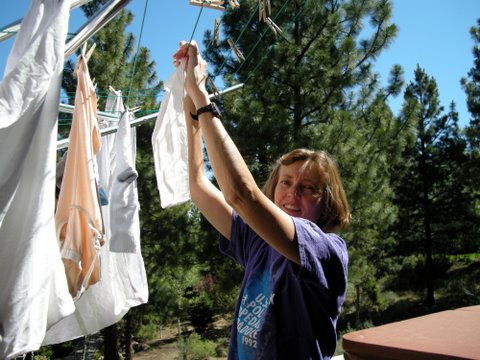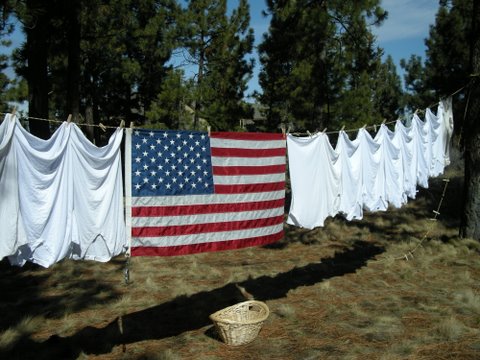
Editor’s Note: Sightline’s map of clothesline bans across the continent already shows 217 communities that forbid solar drying. (Email your tips about other bans to editor@sightline.org.) Legislators in Oregon and Washington and a city councilor in Seattle have expressed interest in taking action since we first published on this barrier to no-carbon laundering. But legislative interest is a far cry from legislative victory. After all, Oregon’s Senate bottled up in committee in 2009 a Right-to-Dry law that had passed the state house easily. The difficulty of enacting new laws makes all the more encouraging this story from Sightline volunteer Jon Howland about a path to the Right to Dry that goes through the courts. We’ve since written an update documenting states where clothesline bans are void across the country.
Susan Taylor of Bend, Oregon, may be the poster child of the North American Right-to-Dry movement. For years, she’s been locked in combat with her homeowner association (HOA) over the HOA’s ban on clotheslines. Taylor’s HOA has issued her fines totaling hundreds of dollars and on two occasions, haters of hung laundry even came by moonlight to clip her cord.
Recently, Taylor uncovered something interesting. An obscure 1979 Oregon law may already shield the legality of sunning her wardrobe.
This law appears to have legalized clotheslines in her state 32 years ago (with an exception detailed below). The law says that no property contract such as an HOA covenant can restrict a buyers’ use of solar energy systems. Any restrictions on “solar radiation as a source for heating, cooling or electrical energy” are “void and unenforceable.”
Is Taylor’s clothes line a solar energy system? Physics says “yes”: solar radiation provides the heat that evaporates water in wet laundry. No appellate court in Oregon has ever ruled on this point, though, so anti-sun-drying HOA’s may sue.
If Taylor—or some other laundry-hanging Oregonian—can successfully make the case that clotheslines are a form of solar energy, she will be shielded under existing state law!
My advice to Oregonians? Dry on! If your HOA complains, point them to Oregon Statute 105.880. If your HOA sues you, you can be the test-case plaintif—the Oliver Brown of Brown v. Board of Education—who establishes the Right to Dry for all!

Two further notes:
1. The text of the statute follows:
105.880 Conveyance prohibiting use of solar energy systems void.
(1) No person conveying or contracting to convey fee title to real property shall include in an instrument for such purpose a provision prohibiting the use of solar energy systems by any person on that property.
(2) Any provision executed in violation of subsection (1) of this section after October 3, 1979, is void and unenforceable.
(3) For the purposes of this section, “solar energy system” means any device, structure, mechanism or series of mechanisms which uses solar radiation as a source for heating, cooling or electrical energy. [1979 c.671 §5]
It’s broad legislation. The only cases it appears to exclude are properties not sold since October 3, 1979. So residents in homes in HOA’s that have restricted clotheslines continuously since then, and that have never been sold in that period, do not have a Right to Dry in Oregon.
2. Here, again, is our fast-filling map of community clothesline bans.
Alan Durning edited this post.
Read more on clotheslines:

Comments are closed.